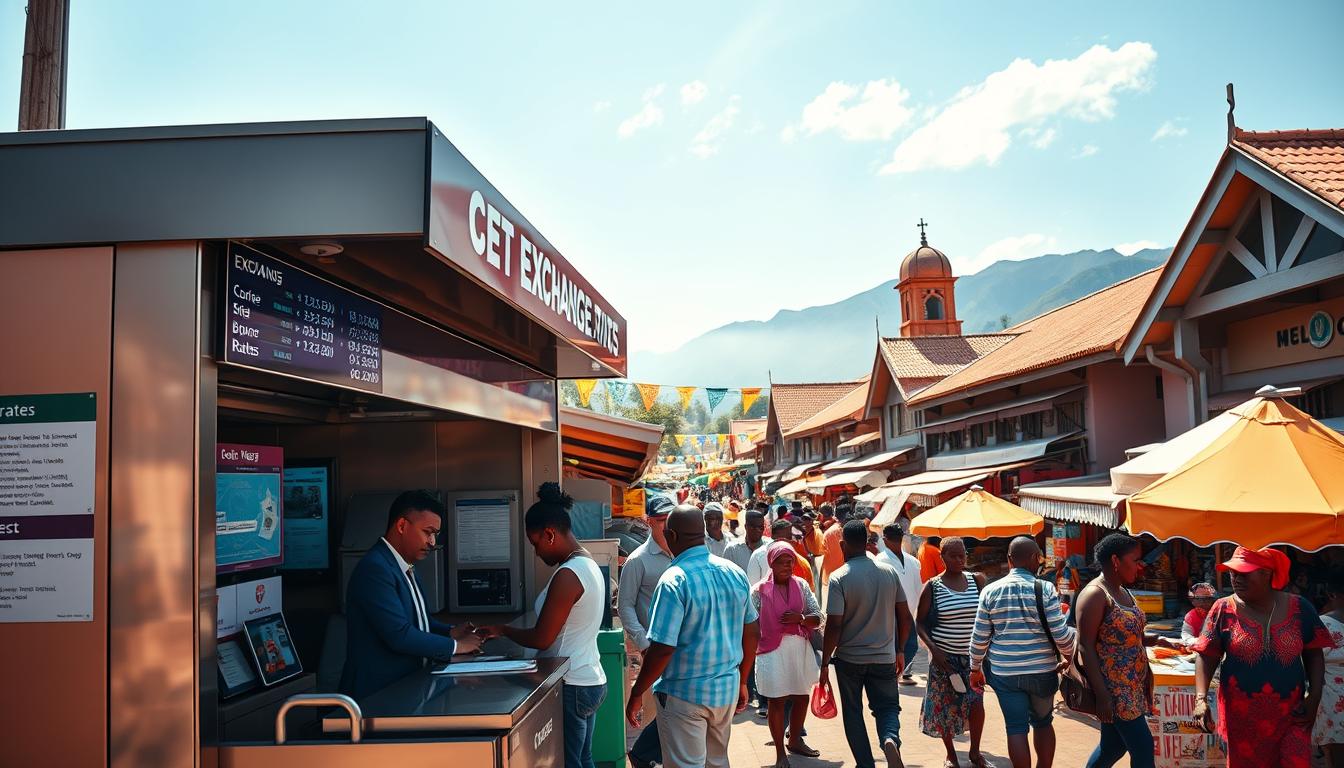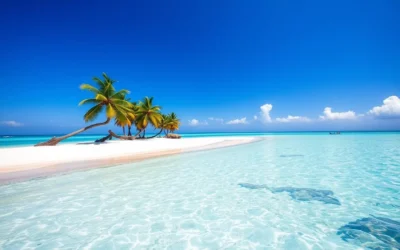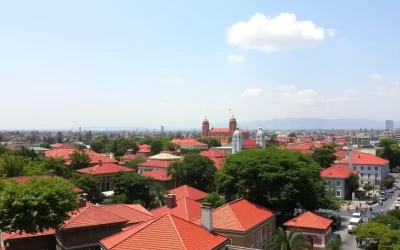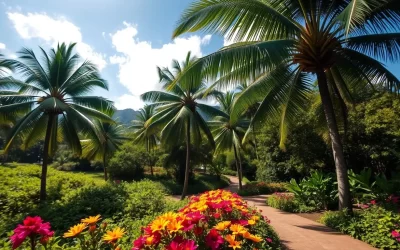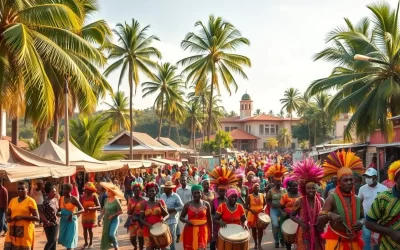Did you know that over 95% of transactions in certain parts of the world are still cash-based? This surprising fact highlights the importance of being prepared when it comes to managing your money while traveling. Whether you’re exploring bustling cities or remote villages, knowing how to handle local currency and payment methods can make your trip smoother and more enjoyable.
This article is designed to help you navigate the ins and outs of exchange rates, the best ways to carry cash, and how to use cards safely. You’ll also learn practical tips for setting a budget and avoiding common pitfalls. From understanding denominations to finding reliable exchange providers, we’ve got you covered.
Traveling is all about new experiences, and being prepared with the right money strategies ensures you can focus on the adventure. Let’s dive into everything you need to know to make your next trip stress-free and memorable.
Understanding Monetary Basics in Madagascar
The Malagasy Ariary is the heart of financial transactions in Madagascar. As the official currency, it reflects the unique identity of this island nation. Knowing how to use it effectively can make your trip smoother and more enjoyable.
Overview of the Malagasy Ariary
The Malagasy Ariary (MGA) is the only accepted currency in the country. Introduced in 1961, it replaced the Malagasy Franc. The Central Bank of Madagascar regulates its circulation and ensures stability. This bank plays a crucial role in maintaining the rate and managing economic policies.
Key Currency Denominations and Symbols
The Ariary comes in both coins and banknotes. Common denominations include 100, 200, 500, 1,000, 2,000, 5,000, and 10,000 Ariary. Each note features vibrant designs, often highlighting the country’s rich biodiversity, including the iconic lemur.
Transactions in Madagascar are primarily cash-based, especially in rural areas. Carrying smaller denominations is advisable for everyday purchases. While credit cards are accepted in cities, having local money ensures you’re prepared for any situation.
Understanding the Malagasy Ariary not only helps you manage your finances but also connects you to the culture of this unique country. From bustling markets to serene landscapes, the Ariary is your key to exploring all that Madagascar has to offer.
Navigating Currency Exchange in Madagascar
Getting the best exchange rate can save you money and make your trip more enjoyable. Knowing where and when to exchange your money is crucial for a smooth travel experience. This section will guide you through the process, helping you avoid unnecessary fees and get the most value for your dollars.
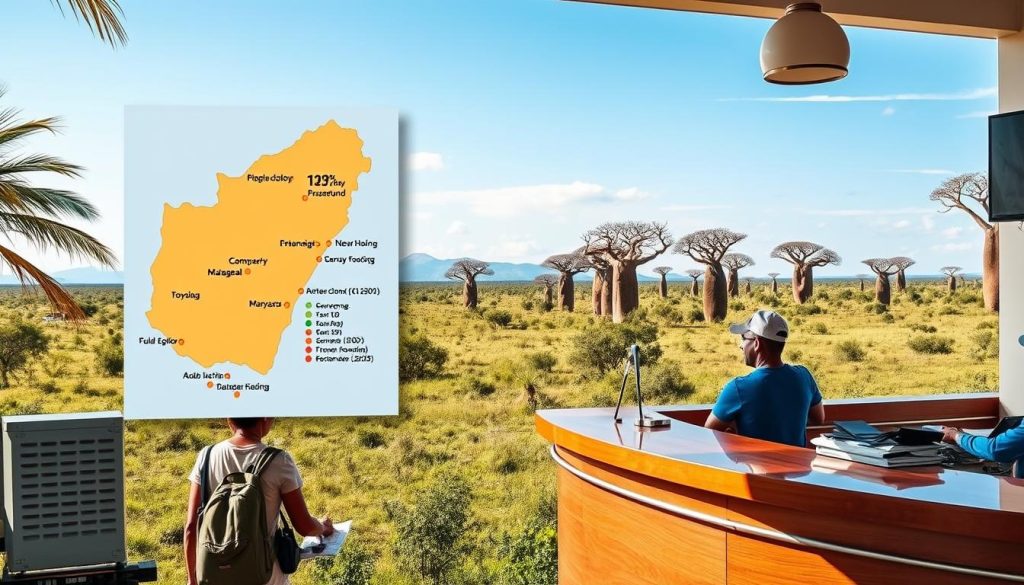
Where and When to Exchange Your USD
Exchanging money at the right place and time ensures you get the best deal. Avoid high-cost locations like airports or hotels, as they often charge marked-up rates. Instead, look for local banks or authorized exchange offices in cities. These locations typically offer better rates and lower fees.
Plan ahead to avoid last-minute exchanges. Carrying some local currency before you arrive can save you time and stress. If you’re traveling to remote areas, ensure you have enough cash for the day, as access to exchange services may be limited.
Understanding Mid-Market Rates and Markups
The mid-market rate is the real exchange rate between two currencies. However, most exchange providers add a markup, increasing the cost for you. Understanding this difference can help you make smarter financial decisions.
Here’s a quick comparison of exchange options:
| Exchange Option | Rate | Fees |
|---|---|---|
| Airport Exchange | Marked-up | High |
| Local Bank | Mid-market | Low |
| Travel Card | Competitive | Minimal |
Using a multi-currency travel card can be a smart choice. These cards often offer competitive rates and low transaction fees. They’re also safer than carrying large amounts of cash, especially on the road.
By understanding where and when to exchange your money, you can make your trip more enjoyable and stress-free. Keep these tips in mind to get the most out of your travel budget.
Using Travel Cards and ATMs Safely
Travel cards and ATMs are essential for safe and convenient transactions abroad. They offer flexibility, security, and cost savings, making them ideal for managing your finances while exploring new destinations. Whether you’re in a bustling city or a remote area, knowing how to use these tools effectively can enhance your travel experience.
Benefits of Multi-Currency Travel Cards
Multi-currency travel cards, like the Wise Multi-Currency Card, are a game-changer for travelers. They support over 40 currencies and offer mid-market exchange rates, saving you from hidden fees. These cards are not linked to your everyday bank account, adding an extra layer of security.
Here are some key advantages:
- Low fees: Minimal transaction and withdrawal charges compared to traditional bank cards.
- Flexibility: Load multiple currencies and switch between them as needed.
- Safety: Block or replace your card instantly if lost or stolen.
“Using a multi-currency card has made my travels so much easier. I no longer worry about carrying large amounts of cash or dealing with unfavorable exchange rates.” – A satisfied traveler
Finding and Using ATMs in Antananarivo
In major cities like Antananarivo, ATMs are widely available and easy to use. They provide a convenient way to withdraw local currency without the high fees associated with airport exchanges. Here’s what you need to know:
Most ATMs accept international cards, but it’s wise to check with your bank beforehand. Withdraw smaller amounts frequently to minimize risks and avoid carrying too much cash. Always use ATMs located in secure, well-lit areas, such as banks or shopping centers.
Here’s a quick comparison of popular travel cards and their ATM withdrawal limits:
| Card | Withdrawal Limit | Fees |
|---|---|---|
| Wise Multi-Currency Card | $6,000/month | Low |
| Chime Travel Card | $500/day | None |
| Monzo Travel Card | No limit | Minimal |
By using travel cards and ATMs wisely, you can enjoy a hassle-free journey. These tools not only save you money but also keep your funds secure, allowing you to focus on the adventure ahead.
Payment Methods: Cash vs. Card in Madagascar
When traveling, choosing the right payment method can make or break your experience. In many places, cash is king, especially for small, everyday transactions. However, cards offer convenience and security for larger purchases. Understanding when to use each can save you time, money, and stress.
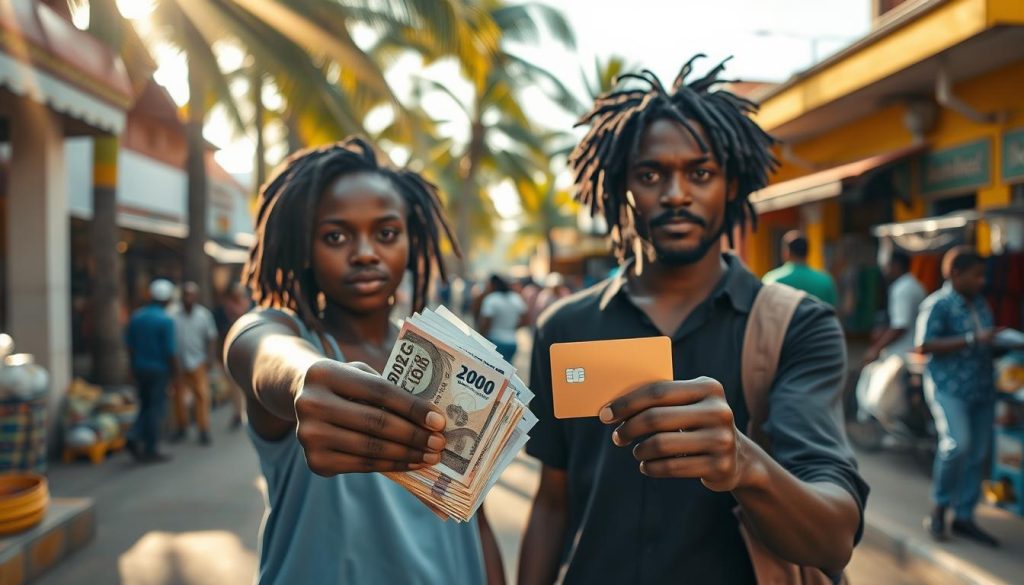
Managing Daily Expenses with Local Cash
In many areas, especially rural ones, cash is the only accepted form of payment. Small vendors, markets, and local transport often don’t accept cards. Carrying local currency ensures you’re prepared for these situations.
For example, buying street food, souvenirs, or paying for a taxi typically requires cash. Smaller denominations are particularly useful for these transactions. Always keep some on hand to avoid inconvenience.
How to Avoid Foreign Transaction Fees
Using a credit card can be convenient, but foreign transaction fees can add up quickly. To avoid these, consider using a travel card or a bank that offers fee-free international transactions.
Here are some tips:
- Choose a card with no foreign transaction fees.
- Always pay in the local currency to avoid dynamic currency conversion charges.
- Withdraw larger amounts less frequently to minimize ATM fees.
“Using a travel card with no foreign transaction fees has saved me hundreds of dollars on my trips.” – A frequent traveler
By balancing cash and card usage, you can enjoy a seamless travel experience. Bring both to ensure you’re ready for any situation, from small purchases to larger expenses.
Madagascar: Ultimate Travelers Guide to Currencies & Payments
Planning your finances is a crucial step for any trip. A well-thought-out budget ensures you can enjoy your adventure without worrying about overspending. Start by estimating your daily expenses, including accommodation, meals, transportation, and activities.
For example, budget travelers can expect to spend around $90 per day, while luxury travelers may need up to $300. Always allocate extra funds for unexpected costs, such as emergencies or last-minute activities. This approach keeps your money organized and your trip stress-free.
Step-by-Step Budgeting Tips
Here’s a simple guide to setting your travel budget:
- List all expenses: Include flights, accommodation, meals, and activities.
- Estimate daily costs: Use online resources or travel apps for accurate estimates.
- Add a buffer: Set aside 10-15% of your total budget for unexpected expenses.
- Track spending: Use budgeting apps to monitor your expenses in real-time.
Digital tools like travel apps make budgeting easier. They help you track your spending and adjust your plans as needed. This ensures you stay within your budget while enjoying your trip to the fullest.
Choosing a Reliable Provider for Travel Money
Selecting the right provider for your travel money is essential. Look for services that offer competitive exchange rates and low fees. Multi-currency travel cards, like the Wise Multi-Currency Card, are a popular choice. They allow you to load multiple currencies and switch between them easily.
Here’s why they’re a great option:
- Low fees: Minimal transaction and withdrawal charges.
- Flexibility: Use the card in over 40 currencies.
- Security: Block or replace the card instantly if lost or stolen.
“Using a multi-currency card has made managing my travel finances so much easier. I no longer worry about carrying large amounts of cash.” – A satisfied traveler
By choosing a reliable provider and planning your budget carefully, you can focus on enjoying your trip without financial stress. These tips ensure you’re prepared for any situation, from daily expenses to unexpected costs.
Traveler’s Practical Tips for Currency Management
Managing your money wisely while traveling can save you from unnecessary stress and extra costs. Whether you’re exchanging cash or using cards, knowing the right strategies ensures you get the best value for your currency. Here are some practical tips to help you avoid common pitfalls and make the most of your travel budget.

Avoiding Common Currency Exchange Pitfalls
One of the biggest mistakes travelers make is exchanging money at the wrong places. Airports and hotels often charge high fees and offer poor rates. Instead, use local banks or authorized exchange offices for better deals.
Another tip is to check the mid-market rate before exchanging. This is the real exchange rate without markups. Many providers add hidden fees, so always compare options to avoid overpaying.
Here’s a quick comparison of exchange options:
| Exchange Option | Rate | Fees |
|---|---|---|
| Airport Exchange | Marked-up | High |
| Local Bank | Mid-market | Low |
| Travel Card | Competitive | Minimal |
Warning Signs of Dynamic Currency Conversion
Dynamic Currency Conversion (DCC) is a common trap that can cost you more. This happens when a merchant offers to charge you in your home currency instead of the local one. While it may seem convenient, the exchange rate used is often unfavorable.
Here are some warning signs to watch for:
- The merchant asks if you want to pay in your home currency.
- The receipt shows two currency amounts.
- The total seems higher than expected.
Always choose to pay in the local currency to avoid these extra costs. It’s a simple tip that can save you a significant amount of money over time.
By staying informed and following these tips, you can manage your currency effectively and enjoy a stress-free trip. Check the exchange rate frequently and plan ahead to make the most of your travel budget.
Integrating Local Payment Systems with Global Needs
In today’s interconnected world, blending local and global payment systems is essential for seamless travel. Whether you’re exploring bustling cities or remote areas, having the right tools ensures you’re prepared for any financial situation. Mobile banking solutions in this island nation can bridge the gap between local and international needs, making your trip smoother and more enjoyable.
Leveraging Mobile Banking in Madagascar
Mobile banking has become a game-changer for travelers. It allows you to manage your finances on the go, track expenses, and even handle exchange rates. Many local banks offer apps that let you check balances, transfer funds, and pay bills effortlessly. Combining these services with international travel cards creates a powerful financial toolkit.
Here’s why mobile banking is a smart choice:
- Convenience: Access your accounts anytime, anywhere.
- Cost Savings: Avoid high fees associated with traditional banking.
- Security: Monitor transactions in real-time and detect fraud quickly.
“Using mobile banking has made managing my travel finances so much easier. I can track my spending and exchange rates without any hassle.” – A frequent traveler
To get started, download the app of a trusted local bank. Ensure it supports features like multi-currency accounts and real-time notifications. This way, you can stay on top of your finances while exploring new places.
By integrating mobile banking with your travel plans, you can enjoy a hassle-free experience. It’s a simple yet effective way to manage your money and focus on the adventure ahead.
Safety and Security Tips for Handling Your Money
Keeping your money safe while traveling is one of the most important things you can do to ensure a smooth experience. Whether you’re exploring a bustling city or a remote area, being prepared can save you from unnecessary stress. Here’s how to protect your funds and stay secure on the road.
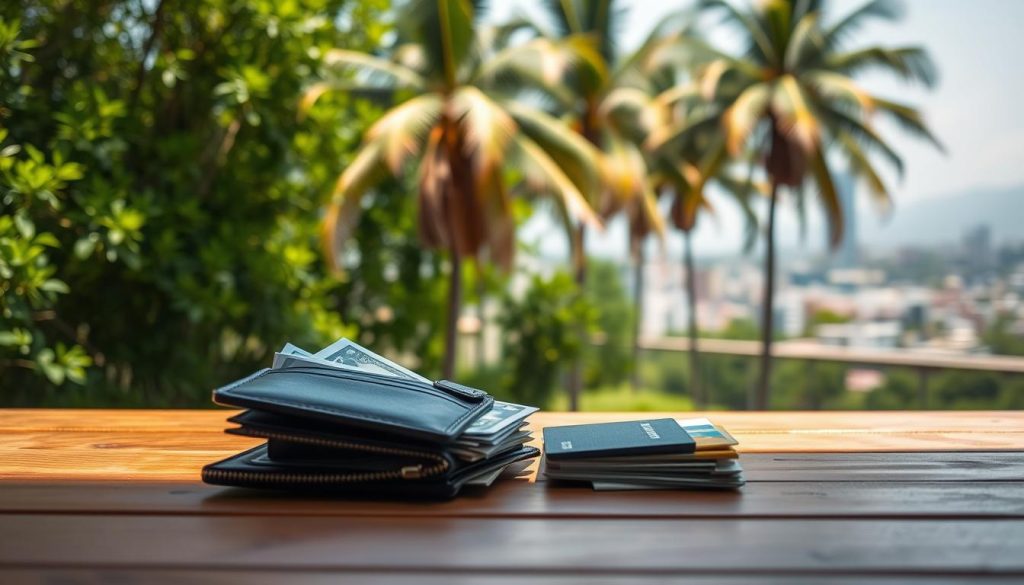
Protecting Your Funds in High-Traffic Areas
Busy cities and crowded areas are often hotspots for petty crimes like pickpocketing. To safeguard your cash and cards, consider these tips:
- Use a money belt: Keep your valuables hidden under your clothing.
- Split your funds: Carry only what you need for the day and leave the rest in a secure place.
- Avoid flashy displays: Don’t draw attention to your wallet or expensive items.
In high-risk zones, such as markets or public transport, stay vigilant. Keep your belongings close and avoid distractions like your phone.
Emergency Preparedness and Travel Insurance Advice
Unexpected situations can happen, so it’s essential to be prepared. Travel insurance is a must for any trip, offering coverage for medical emergencies, theft, and trip cancellations. Here’s what to look for:
- Medical coverage: Ensure it includes evacuation and treatment in the country you’re visiting.
- Theft protection: Choose a plan that covers lost or stolen items, including cash and cards.
- 24/7 support: Access to emergency assistance can make a big difference in a crisis.
“Having travel insurance gave me peace of mind during my trip. When my bag was stolen, they helped me recover my losses quickly.” – A satisfied traveler
By taking these precautions, you can focus on enjoying your experience without worrying about your money. Stay alert, plan ahead, and travel with confidence.
Expert Insights and Real-World Reviews on Malagasy Transactions
Navigating financial transactions in a new country can be daunting, but expert insights can make it easier. Whether you’re planning your itinerary or managing daily expenses, trusted advice from professionals ensures you’re prepared for any situation. This section shares perspectives from international finance writers and top recommendations from travel experts to help you handle transactions effectively.
Perspectives from International Finance Writers
Claire Millard, a renowned finance writer, emphasizes the importance of understanding local currency systems. “Researching exchange rates and fees before your trip can save you significant money,” she advises. Her insights highlight the value of planning ahead to avoid unnecessary costs.
Ileana Ionescu, another expert in global finance, recommends using multi-currency cards for flexibility. “These cards allow you to switch between currencies easily and often offer better rates than traditional banks,” she explains. Combining their advice can help you make smarter financial decisions while traveling.
Top Recommendations from Travel Experts
Travel experts suggest balancing cash and card usage for convenience and security. In rural areas, cash is often the only option, while credit cards are widely accepted in cities. Here are their top tips:
- Carry smaller denominations: Useful for everyday purchases like meals or transport.
- Use ATMs in secure locations: Avoid high fees and ensure safety.
- Monitor exchange rates: Stay informed to get the best value for your money.
“Planning your transactions ahead of time ensures a smoother travel experience. Always have a mix of payment methods to stay prepared.” – A seasoned travel expert
By following these expert insights, you can manage your finances confidently and focus on enjoying your travel adventures. Whether you’re exploring bustling cities or remote areas, these tips ensure you’re ready for any financial situation.
Conclusion
Ensuring your finances are in order is key to a stress-free journey. This guide has highlighted the importance of understanding local currency, managing cash, and using cards effectively. By planning ahead, you can avoid unnecessary fees and get the best exchange rate for your money.
Remember to balance cash and card usage, especially in areas where one may be preferred over the other. Multi-currency travel cards are a great option for flexibility and security. Always choose to pay in the local currency to avoid dynamic currency conversion charges.
With these tips, you can focus on enjoying your trip without financial worries. Whether you’re exploring bustling cities or remote areas, being prepared ensures a smooth and enjoyable experience. Safe travels!
The above is subject to change.
Check back often to TRAVEL.COM for the latest travel tips and deals.
Here are some Tours & Sightseeing suggestions that might pique your interests!
